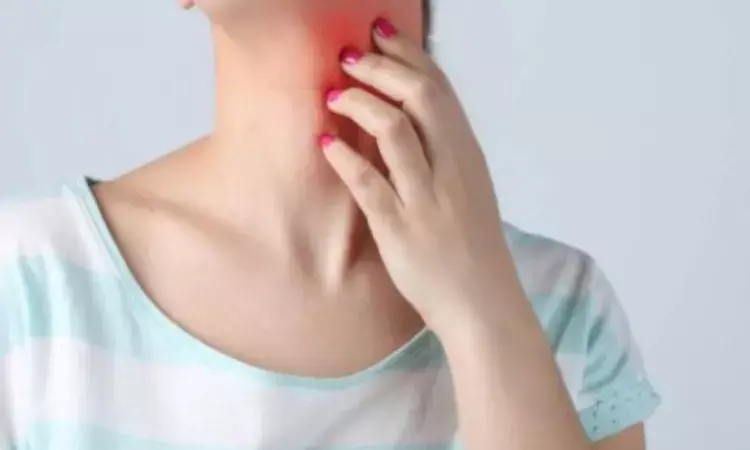- Home
- Medical news & Guidelines
- Anesthesiology
- Cardiology and CTVS
- Critical Care
- Dentistry
- Dermatology
- Diabetes and Endocrinology
- ENT
- Gastroenterology
- Medicine
- Nephrology
- Neurology
- Obstretics-Gynaecology
- Oncology
- Ophthalmology
- Orthopaedics
- Pediatrics-Neonatology
- Psychiatry
- Pulmonology
- Radiology
- Surgery
- Urology
- Laboratory Medicine
- Diet
- Nursing
- Paramedical
- Physiotherapy
- Health news
- Fact Check
- Bone Health Fact Check
- Brain Health Fact Check
- Cancer Related Fact Check
- Child Care Fact Check
- Dental and oral health fact check
- Diabetes and metabolic health fact check
- Diet and Nutrition Fact Check
- Eye and ENT Care Fact Check
- Fitness fact check
- Gut health fact check
- Heart health fact check
- Kidney health fact check
- Medical education fact check
- Men's health fact check
- Respiratory fact check
- Skin and hair care fact check
- Vaccine and Immunization fact check
- Women's health fact check
- AYUSH
- State News
- Andaman and Nicobar Islands
- Andhra Pradesh
- Arunachal Pradesh
- Assam
- Bihar
- Chandigarh
- Chattisgarh
- Dadra and Nagar Haveli
- Daman and Diu
- Delhi
- Goa
- Gujarat
- Haryana
- Himachal Pradesh
- Jammu & Kashmir
- Jharkhand
- Karnataka
- Kerala
- Ladakh
- Lakshadweep
- Madhya Pradesh
- Maharashtra
- Manipur
- Meghalaya
- Mizoram
- Nagaland
- Odisha
- Puducherry
- Punjab
- Rajasthan
- Sikkim
- Tamil Nadu
- Telangana
- Tripura
- Uttar Pradesh
- Uttrakhand
- West Bengal
- Medical Education
- Industry
High-Dose Intravenous Immunoglobulins Improve Outcomes in Autoimmune Bullous Diseases:

Germany: A recent study published in the Journal Of The European Academy Of Dermatology & Venereology by M. Bertlich and colleagues suggests that the addition of high-dose intravenous immunoglobulins (IVIg) to conventional immunosuppressants (CI) can significantly enhance treatment outcomes in patients with autoimmune bullous diseases (AIBD). This research provides valuable insights into long-term treatment strategies for AIBD.
AIBDs encompass a group of rare autoimmune disorders characterised by blistering of the skin and mucous membranes. The study aimed to compare the effectiveness of CI-only versus a combination of CI and IVIg (CI-IVIg) in treating AIBD, specifically focusing on time-to-treatment escalation (TTE) and treatment escalation (TE) over 1, 2, and 3 years.
Patients receiving CI-IVIg showed a significantly longer median TTE compared to those treated with CI-only. The TTE for CI-IVIg was 59.9 months, whereas CI-only had a median TTE of 21.8 months.
Multivariate analysis revealed that CI-IVIg independently predicted a prolonged TTE.
The likelihood of treatment escalation was significantly lower in the CI-IVIg group compared to the CI-only group at 1, 2, and 3 years.
Time-to-full remission (TFR) and cumulative steroid doses in the first 3 years did not differ significantly between the two treatment groups.
Median cumulative steroid doses in the first year of treatment indicated similar initial reduction steps between CI-IVIg and CI-only.
The study suggests that incorporating high-dose IVIg as an adjunctive therapy alongside conventional immunosuppressants can lead to more extended periods of treatment response in patients with recalcitrant AIBD. Notably, this study is the first to provide a comparative long-term analysis of IVIg in AIBD and utilised a related-sample design.
However, it's essential to acknowledge the limitations of the study, including its retrospective nature, the heterogeneity of the patient population, and the potential for variations in disease severity over time. Further research, including prospective studies and direct comparisons, is necessary to validate these findings and refine treatment strategies for AIBD patients.
This study represents a promising step forward in improving the management of AIBD, offering hope for enhanced treatment outcomes and improved quality of life for individuals battling these challenging autoimmune disorders.
Reference:
Bertlich, M., Bertlich, I., Plümacher, N., Hadaschik, E., Enk, A., & Hoffmann, J. H. O. (2023). High‐dose intravenous immunoglobulin co‐treatment prolongs time‐to‐treatment escalation in autoimmune bullous diseases: A monocentric retrospective cohort study. Journal of the European Academy of Dermatology and Venereology: JEADV. https://doi.org/10.1111/jdv.19437
Dr Kamal Kant Kohli-MBBS, DTCD- a chest specialist with more than 30 years of practice and a flair for writing clinical articles, Dr Kamal Kant Kohli joined Medical Dialogues as a Chief Editor of Medical News. Besides writing articles, as an editor, he proofreads and verifies all the medical content published on Medical Dialogues including those coming from journals, studies,medical conferences,guidelines etc. Email: drkohli@medicaldialogues.in. Contact no. 011-43720751


